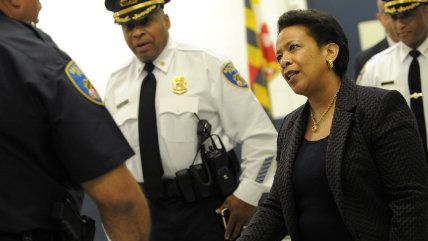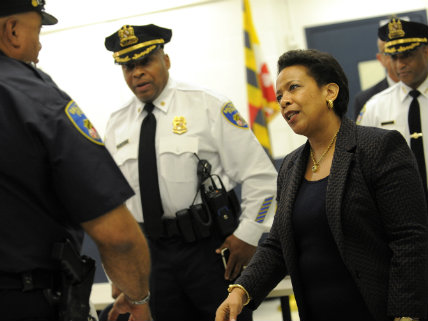Read the Most Blood-Boiling Parts of the Justice Department's Scathing Report on Baltimore Police
Unconstitutional stops, excessive force, racist slurs, and little internal oversight.


The Justice Department's Civil Rights Division released its long-awaited investigation into the Baltimore Police Department Wednesday, finding the department engaged in a pattern and practice of civil rights violations against the citizens it is sworn to protect.
Launched after the 2015 death of Baltimore resident Freddie Gray while in police custody, the Justice Department investigation found, among other things, that Baltimore police regularly engaged in unconstitutional stops and arrests, discriminated against African-Americans, used excessive and unreasonable force against youth and the mentally ill, and unlawfully detained, arrested, and retaliated against members of the public for engaging in protected speech.
"These violations have deeply eroded the mutual trust between BPD and the community it serves, trust that is essential to effective policing, as well as officer and public safety," Vanita Gupta, the head of the Justice Department's Civil Rights Division, said in a press conference Wednesday morning. "The problems in Baltimore didn't happen overnight or appear in a day. The pattern or practice we found results from long-standing, systemic deficiencies at BPD. The agency fails to provide officers with sufficient policy guidance and training; fails to collect and analyze data regarding officers' activities; and fails to hold officers accountable for misconduct."
Among the litany of abuses, oversights, and failings of the Baltimore Police Department, the Justice Department report found the city's police regularly retaliated against citizens for what amounted to mouthing off to officers:
In one case from 2011, officers tackled and used a taser to drive-stun a young black man who was, in their view, "loitering" near a market during business hours in downtown Baltimore. When told to move, the young man refused and swore at the officers, who then tackled him. Nothing indicated the man was armed, violent, or presented a danger to the officers or others. Supervisors who investigated and approved the incident failed to recognize that the force appeared to be retaliatory, even though the man, when interviewed, told them he believed he was tackled because he cursed at the officers.
Citizens who attempted to report misconduct faced similar threats:
In another incident from 2010, an African-American man stated that he witnessed officers use excessive force during an arrest and punch a fourteen-year-old boy who attempted to film the arrest on his cell phone. The African-American man recounted that the officers used "the word 'n****r' frequently" and asked him if he "take[s] it up the ass by Allah." When the man went to the district headquarters to report the misconduct, he was met by the same officers who told him, "What brings your black ass back here?"
Even in cases where citizens managed to report misconduct, the Baltimore Police Department's internal investigations were inadequate and half-hearted:
BPD conducted a similarly inadequate investigation in a 2010 case that also alleged racemotivated misconduct. There, an African-American man alleged that while being held in a cell at the Southwest District, several officers called him a "monkey" and a "n****r" while beating him. The investigative file, which consisted solely of a few summary paragraphs about the incident, revealed that the investigating officer administratively closed the case without even reading a related incident report because "it was locked in the report box at the time of my investigation."
The Justice Department investigation also found that officers regularly engaged in unconstitutional stops and arrests to "clear corners." Those unconstitutional actions were sometimes performed at the command of supervising officers, the report found. In one case, a Baltimore police sergeant ordered a patrol car to perform and unconstitutional stop while a Justice Department official was in the car:
During a ride-along with Justice Department officials, a BPD sergeant instructed a patrol officer to stop a group of young African-American males on a street corner, question them, and order them to disperse. When the patrol officer protested that he had no valid reason to stop the group, the sergeant replied "Then make something up." This incident is far from anomalous. A different BPD sergeant posted on Facebook that when he supervises officers in the Northeast District, he encourages them to "clear corners," a term many officers understand to mean stopping pedestrians who are standing on city sidewalks to question and then disperse them by threatening arrest for minor offenses like loitering and trespassing. The sergeant wrote, "I used to say at roll call in NE when I ran the shift: Do not treat criminals like citizens. Citizens want that corner cleared."
The Justice Department was also "troubled" by the BDP Sex Offense Unit's cavalier attitude toward women who attempted to report sexual assaults:
One victim advocate told us about a detective in the BPD Sex Offense Unit making comments at a party, in the company of BPD officers and victim advocates, that, "in homicide, there are real victims; all our cases are bullshit." When another person suggested the detective soften the statement, the detective added, "Ok, 90 percent." We also reviewed e-mail correspondence between a BPD officer and a prosecutor in which they openly expressed their contempt for and disbelief of a woman who had reported a sexual assault: the prosecutor wrote that "this case is crazy. . . I am not excited about charging it. This victim seems like a conniving little whore. (pardon my language)."; the BPD officer replied, "Lmao! I feel the same."
According to the report, the Baltimore Police Department also did little to investigate claims that its officers coerced sex workers. "We heard complaints from the community that some officers target members of a vulnerable population—people involved in the sex trade—to coerce sexual favors from them in exchange for avoiding arrest, or for cash or narcotics," the report reads. "Unfortunately, we not only found evidence of this conduct in BPD's internal affairs files, it appeared that the Department failed to adequately investigate allegations of such conduct, allowing it to recur."
The Justice Department and the Baltimore Police Department have now entered into a consent agreement to implement reforms.


Show Comments (85)